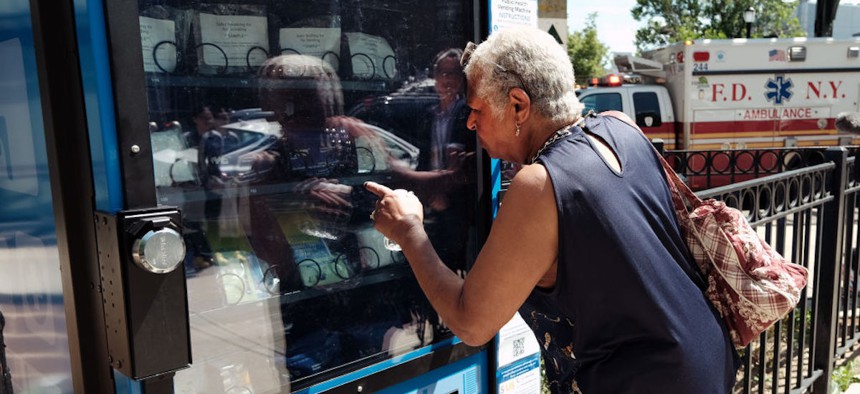Vending machines expand scope, impact of public health initiatives

Rose Meredith uses a new vending machine in Brooklyn that will disperse fentanyl test strips and naloxone as well as hygiene kits, maxi pads, Vitamin C, and COVID-19 tests for free on June 5, 2023, in New York City. Spencer Platt via Getty Images
The self-serve kiosks distribute health and hygiene products for free, which experts say improves accessibility to essential services and helps an increasingly pinched public health workforce.
From candy to makeup products and even cake, vending machines are a reliable source of last-minute needs for passersby in schools, airports and offices. With a couple of coins or the swipe of a card, anyone can instantly have the product they want in their hands.
The easy access and self-service features of vending machines have a growing number of state and local governments turning to the kiosks to improve health equity and outcomes for their community.
Public-health vending machines that operate 24/7 and dispense health and hygiene products for free remove barriers to access for individuals who are embarrassed or can’t afford to seek health care services, said Dr. Georges Benjamin, executive director of the American Public Health Association.
Public-health vending machines were first deployed in Nevada in 2017 to dispense free sterile syringes to prevent outbreaks of hepatitis C and HIV. But now, they are getting increased attention amid the nationwide opioid crisis, as public health officials stock the machines with free harm-reduction materials like overdose reversal medications and testing strips. At least 33 states and the District of Columbia have deployed naloxone machines thus far, CNN reported.
Governments that set up health-product kiosks are making it easy for the community to access these essential items. They also demonstrate that officials recognize and are meeting their residents’ needs, which could help spread awareness of public health issues and “build bridges with the community,” said Adriane Casalotti, chief of government and public affairs for the National Association of County and City Health Officials. Health departments have reported, for instance, that they use community feedback to determine where to put vending machines and what to stock them with.
Plus, kiosks enable community members to get sensitive health products, such as overdose reversal medication or drug testing strips, in a more private manner than showing up to a facility where staff can put a face to a name, she said. Sometimes, simply interacting with another person can deter individuals from seeking potentially life-saving supplies because of the stigma attached to drug use.
The kiosks can also be a cost-saver for governments, especially on emergency health care services, Benjamin said. If someone can prevent an overdose by ingesting Narcan they got from a vending machine, for example, then that lightens the squeeze on ambulance and hospital costs.
More data and research are needed, however, to determine the impact of the vending machines. An economic analysis will be particularly helpful to see if the kiosks can save on operational costs for the government, considering the machines must be restocked daily and require continued maintenance. But managing and maintaining the vending machines could also create job opportunities, Benjamin said.
Additionally, there’s less burden on public health staff to distribute health care products when individuals can obtain products on their own, Casalotti said. That gives staff time for higher priority tasks such as community outreach, which can in turn help agencies better adapt the kiosks to residents’ needs.
But vending machines go beyond just the drug harm-reduction landscape. In Nashville, Tennessee, for instance, the Rutherford County School District is deploying kiosks stocked with personal hygiene products like feminine hygiene products, deodorant and wet wipes for students who may not have those items at home. And Washington state recently launched a vending-machine program to dispense COVID and flu testing kits. Local health jurisdictions can opt in to supply other products like pregnancy tests, STI tests, fentanyl test strips.
“We’re still seeing dozens of people die each week from COVID-19, especially amongst our high-risk populations [such as] those who are elderly or those who have chronic conditions,” said Tao Sheng Kwan-Gett, chief science officer for the state. Ensuring people had tests was easier earlier in the pandemic, he said, when tests could be distributed for free to households. Now however, the access to tests has diminished, but the need for them has not.
“These vending machines are a way to try to meet that need, especially in communities that traditionally have had barriers to accessing traditional health care or public health services,” he said.
Washington state is spending an estimated $41,000 per vending machine through a lease agreement with the Virginia-based company Longview International Technology Solutions, said public information officer John Doyle in an email. The installation, maintenance and supplies of the kiosks is paid for by remaining federal COVID-19 funds.
“By addressing accessibility, equity, education and stigma, kiosks distributing free healthcare supplies can significantly contribute to restoring and enhancing trust between communities and public health systems,” Doyle said. “This trust is essential for effectively implementing public health initiatives and encouraging individuals to manage their health proactively.”
The recent focus on vending machines reflects “a movement more broadly in public health to make sure that the stuff … that are needed for public health are out in the community and ready to go, as opposed to having them behind lock and key and [requiring] people to ask to access them,” Casalotti said.
NEXT STORY: States clash over what responsible AI looks like






